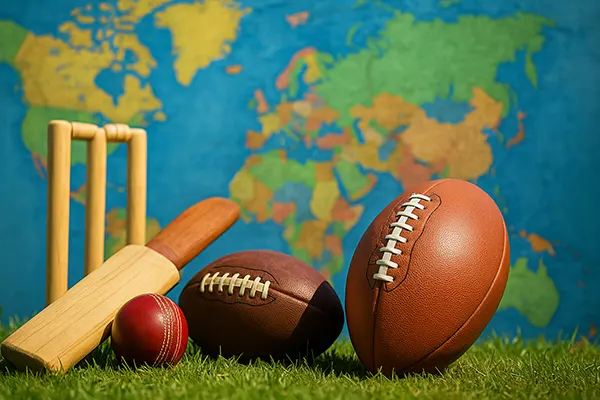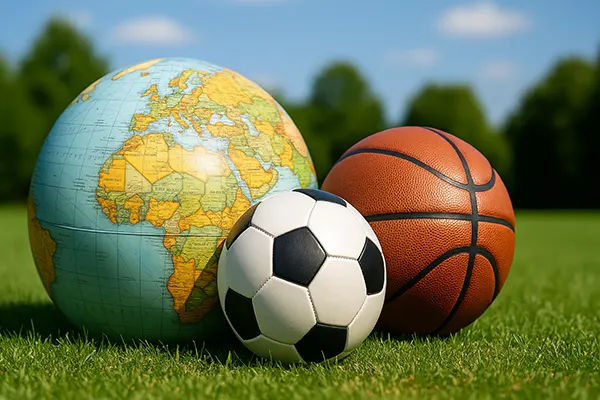Globalisation of Sport: How British Imperialism Shaped the Modern Sporting Map

The history of modern sport cannot be separated from the influence of the British Empire. During the height of its global power in the nineteenth and early twentieth centuries, Britain exported not only its political and economic structures but also its cultural practices. Football, rugby, and cricket, which were initially local pastimes, became embedded into the identity of many nations through imperial expansion. Over time, international competitions and the Olympic Games cemented these disciplines as global phenomena that continue to shape culture, diplomacy, and identity in 2025.
The Spread of British Sports Through Empire
When the British Empire expanded across continents, it carried with it not just governance but also recreational traditions. Football became a unifying activity in colonies, played in schools and military camps. Cricket, with its emphasis on rules and fair play, was promoted as a symbol of gentlemanly conduct and adopted by countries such as India, Australia, and the West Indies. Rugby, meanwhile, found strong roots in South Africa and New Zealand, where it became integral to national identity.
Missionary schools and colonial education systems reinforced the spread of these sports. Young students were encouraged to take part in structured athletic activities, which mirrored British values of discipline, teamwork, and loyalty. This institutional backing made sport more than entertainment—it became a cultural export embedded within social structures.
By the late nineteenth century, local leagues and competitions were thriving in many colonies. What began as imperial cultural dominance later evolved into arenas where former colonies could assert independence and pride by excelling in the very games introduced by Britain.
Sport as a Tool of Integration and Identity
Although initially a marker of colonial influence, British sports became tools of national expression. India’s success in cricket transformed a colonial sport into a national passion, symbolising both unity and resistance. Similarly, football in Africa became a platform for youth culture and political expression, connecting local pride with international recognition.
In New Zealand, the All Blacks rugby team represents far more than athletic ability. The integration of Māori traditions, such as the haka, illustrates how indigenous practices reshaped a colonial sport into a vehicle of cultural identity. This blending shows how imperial legacies can be transformed into authentic national symbols.
Thus, while the spread of sport was rooted in imperialism, the appropriation and reinvention of these games by local populations reveal the resilience and creativity of nations in redefining their heritage.
From the First Olympics to Today
The rebirth of the Olympic Games in 1896 provided a stage where nations influenced by British sporting traditions could compete on equal terms. Early participation from countries within and beyond the Empire reflected both Britain’s global influence and the emerging desire for shared international sporting culture.
Over time, international federations for football, cricket, and rugby developed standardised rules and global competitions. The World Cup in football, first held in 1930, became a cultural event of unparalleled scale, attracting billions of viewers by the twenty-first century. Cricket’s World Cup and rugby’s equivalent similarly elevated their respective sports to global showcases of talent and rivalry.
By 2025, these competitions remain key cultural touchstones. They reflect both the historical influence of British imperialism and the evolution of sports into independent global industries. Advances in broadcasting and digital media have ensured that these events transcend borders, making them unifying moments in a fragmented world.
Media, Politics, and Sporting Narratives
The media has played a decisive role in framing sports as more than games. From the newspaper coverage of the 1896 Athens Olympics to today’s instant global streaming, journalism has transformed sports into narratives of heroism, conflict, and identity. Sportswriters shaped how audiences perceived national victories and defeats, embedding them into political and cultural memory.
Political leaders have often used sport as a diplomatic tool. Iconic events, such as Nelson Mandela’s use of the 1995 Rugby World Cup in South Africa, demonstrate how sports can unite deeply divided societies. Similarly, the Olympics frequently serve as stages for geopolitical competition, soft power, and cultural exchange.
In today’s interconnected era, media narratives continue to influence how nations project power through sport. Whether through grassroots campaigns, commercial sponsorships, or international tournaments, the stories surrounding athletes and teams remain as significant as the games themselves.

Legacies and Global Impact in 2025
The long-term consequences of Britain’s sporting exports are evident in the institutional and cultural frameworks of modern sport. Governing bodies such as FIFA, the International Cricket Council, and World Rugby maintain rules and traditions shaped by their British origins, even as they adapt to global diversity.
Economically, sports have become multi-billion-pound industries, with broadcasting rights, sponsorships, and tourism creating far-reaching financial impacts. The Premier League in England, the Indian Premier League in cricket, and the Rugby World Cup illustrate how British-influenced sports have developed into economic giants attracting worldwide audiences.
Socially, sports continue to promote community engagement, identity formation, and cross-cultural dialogue. The fact that young people in Lagos, Mumbai, and Buenos Aires follow similar leagues and idols demonstrates how sport remains one of the most powerful unifying forces in an era of global fragmentation.
Challenges and the Future of Global Sport
Despite its successes, global sport faces significant challenges in 2025. Issues such as corruption, inequality in access, and the impact of climate change on major events raise urgent questions about sustainability. Governing bodies are under pressure to ensure transparency and inclusivity.
Additionally, debates about cultural ownership persist. While nations celebrate achievements in football, rugby, and cricket, they must also confront the colonial histories that brought these sports into their societies. The balance between honouring heritage and acknowledging difficult pasts is a continuing conversation.
Looking ahead, sport is likely to remain both a unifying global industry and a contested cultural space. Its British imperial roots will always be part of its story, but its present and future are being written by athletes, fans, and communities across the globe.
